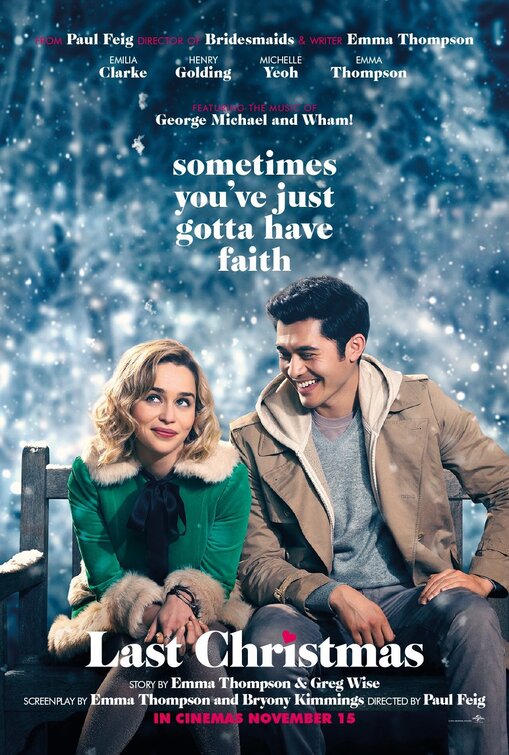Sometimes You’ve Just Gotta Have Faith
Director
Paul Feig
Starring
Emilia Clark
Henry Golding
Michelle Yeoh
Emma Thompson
Set around the festive period in 2017, we are introduced to Kate [Clarke], a young aspiring singer working at a Christmas decoration shop in London. As the story progresses, we learn from her prickly boss Santa (Michelle Yeoh playing a character who has genuinely changed her name to Santa), her mother Petra and her sister Marta that since her operation last Christmas, she has become distant, cold, lazy and selfish. This has gotten her into a great deal of trouble and left her without a place to stay after a series of disastrous house-sharing mishaps. But Kate’s outlook on life slowly starts to change when she meets the wholesome, charming Tom [Golding]. But as Tom has avowed to live life and get away from his mobile phone (locking it in a cupboard), she has difficulty forming a lasting relationship with him, which impacts both her professional and private life.
To give full credit to Paul Feig, he has produced a very visually pleasing chameleon of a film. Aesthetically different from his usual fare, Last Christmas has a distinctly British feel to it, serving as a bit of a love letter to London and the random hidden eccentricities of the city. Admittedly, it’s likely this is due to the script being penned by someone who knows London extremely well, but the direction and production design feel more grounded in a form of reality than the affluential projection of London. More than that, it nails a great sense of rhythm and editing that utilises everyone involved and gives the film a pleasant, familiar sheen and air of quality. On top of that, the cast are fantastic, displaying sublime chemistry throughout. Golding is delightfully charming and wholesome, Yeoh goes from stern to caring to hilarious with great ease and Clarke proves comedy is better suited to her strengths, giving off heavy Sandra Bullock vibes. But despite this, the film is not good. It is a strange aberration, a melting pot of pitch-perfect ingredients with an ultimately disastrous final product. The actors are well cast and perform decently, the synopsis is functional with that hint of festive magic, the direction and cinematography are warm and inviting, there’s a subtle commentary on the current political crisis and the score is a mix of nostalgic George Michael/Wham hits and tender themes by Theodore Shapiro; but none of it comes together.
**spoilers**
To discuss this film and the problems therein, we need to spoil the twist, so consider yourself warned and skip to the final paragraph if necessary. So as the song Last Christmas suggests with the line “Last Christmas I gave you my heart” this film is about a young woman who, on the anniversary of her heart transplant, meets a man who turns out to be the previous owner of that organ. She falls in love with him and becomes a better person in the process, rediscovering who she is and connecting with her family and community in a way she never had before. In essence, this movie is A Christmas Carol by way of Fleabag and Fight Club but with none of the lofty qualities of those titles. For anyone looking, the twist is pretty predictable from the early scenes but I will expand on that further in my highlighted character section. With this twist in mind, the movie goes out of its way to show Kate as a difficult person but rather than seeing someone who is exceptionally selfish, rude, lazy or malevolent, she is just a little immature. In fact, her worst quality seems to be that she is a bit clumsy and a tiny bit promiscuous, which is hardly damning traits to the degree that all her friends kick her out of their flats and that’s before we consider the fact that she had a heart transplant months prior which cast members often refer to as “when you were ill.” It’s this tug-of-war between making Kate both a lost cause and a loveable scamp that constantly finds both the character and the film in this odd middle ground of mediocrity; her roots are showing and she wears a lot of eyeliner therefore tramp, she accidentally breaks things in people’s homes therefore she’s a menace, she doesn’t like her menial retail job therefore she’s lazy. When you breakdown the situations and apply some common sense to it, the conclusion is people are frankly awful to Clarke and it’s a miracle she hasn’t lamped someone sooner.
The whole movie also closes with extreme consequence free ease, like a fairy tale or fable, all it takes is a slight change of outlook and every peripheral issue resolves itself. As with most things in this film, the moral makes sense and has a positive message. Kate’s gestures of atonement are small and simple but they are heartfelt and sincere and because her friends and family recognise this, they accept the act of contrition. But in typical Christmas movie fashion, this works without fail every time and unifies everyone in a flashy, showy finale. Earlier comments about middle class white saviour syndrome are then dismissed with carefree abandon as Kate puts aside her selfish goals (if you consider getting a job as a performer selfish) and spends her spare time trying to help the homeless. That sentence elevates Kate, it should fundamentally make her a better person in the audience’s eyes but it reeks of hackneyed convenience to force a conclusion. What’s more, because of the poorly-defined flaws at the start of the film, the improvements made are hard to quantify.
In truth, it’s less that the film is riddled with a myriad of destructive properties but more one colossal problem. Everything about this film should work but seemingly none of it does and while it is perfect on paper, the execution falls flat. If I had to put a finger on what is to blame, I would have to say it’s the script. The simple synopsis or even elevator pitch for this yarn is perfectly serviceable but when said script made its way on-screen it either lost something in translation or could have done with a few rewrites because it’s all too trite, recurring supporting characters come off as irksome caricatures and nobody in this whimsical nonsense feels real. One could argue that a film of this type doesn’t benefit from grounded reality but again with the script not leaning into more of a Love Actually-style saccharine sweetness, it ends up twee and forced. In a way, it is very reminiscent of Yesterday, which also didn’t really work and failed to execute a decent premise despite an ideal cast and crew, becoming bogged down with absurd, directionless plot lines and far too neat a resolve. But this may all be for naught because while it feels like a heightened made-for-TV movie that got a lucky break, people will likely love it and no doubt return to it again and again, citing it as their favourite Christmas film. A prime example of critic vs audience, as I experienced with the acceptable but altogether mediocre The Holiday, which people still singing their praises for some thirteen years later.
Release Date:
15 November 2019
The Scene To Look Out For:
A minor recurring subplot addresses the fact that Kate’s family are refugees from the former Yugoslavia. More specifically, as the film is set in 2017, it gleans the fears and treatment of European nationals in Britain in the wake of the Brexit referendum verdict. On a bus ride, Kate witnesses a man shouting at a couple speaking in a different language proclaiming that in England you have to speak English, before extending this to anyone else riding the bus. In an attempt to comfort the couple, Kate speaks in their native tongue and says they are indeed welcome. This commentary strikes a chord and feels painful for the fact that this country has endured horrific division off the back of this political act but the film addresses it with a passing nod, aware it cannot simply fix that problem with a local sing-song. I’ve always maintained the era of Brexit and Trump will be prime fodder for cinema but the fact it has cropped up while still in the middle of it all is quite surprising and will no doubt rub some audience members the wrong way; even if the film does deliver a hard truth.
Notable Characters:
**spoilers again**
Henry Golding is great, always is. In this movie he displays an energy, passion and earnestness that pushes through the lacking script. Having said that, while this film relies on emotional connection over technicalities, his character still required a smarter draft and there are so many things about his situation that don’t sit right. Things like Clarke gaining access to his flat. I understand he continually dodges people because he’s not there and I also understand the film’s concept that her new heart is guiding her to information she couldn’t know but that doesn’t explain how she gains access to a dead man’s flat. What’s more, once the revelation hits, you wouldn’t expect to see or hear from Tom again, showing him only in flashback but in spite of this reveal, Kate and Tom have one last interaction, which felt a little uncomfortable as it feels neither mysterious or magical, just a touch awkward followed by Tom literally walking away. Nothing fantastical just a wave and “see you later.”
Highlighted Quote:
“We have this Christmas gibbon”
In A Few Words:
“Decently constructed but far too formulaic and uninventive to properly succeed”
Total Score: 2/5
![The Red Right Hand Movie Reviews [Matthew Stogdon]](https://reviews.theredrighthand.co.uk/wp-content/uploads/2021/12/cropped-header1.png)




